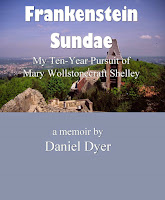Remember—earlier—that
Mary had had a wee flirtation with Washington Irving. The author of “The Legend
of Sleepy Hollow”—perhaps surprised at first, perhaps more?—soon learned that
Mary was serious about him, and, as
we’ve seen, galloped away from her with all the supernatural speed of his
famous Horseman.
Since Bysshe
had drowned in the summer of 1822, Mary had written often in her journal (and
in letters) about her loneliness. She wrote that she threw herself into her
studies—into her writing—and this seemed, at times, to work for her. But
Loneliness is an insistent visitor. And in her letters to Trelawny, who had
been a dear friend to Bysshe and her that dark summer of 1822 when Bysshe and
the others drowned, Mary spoke lightly of marriage—well, of re-marriage.
In a letter
to him in the summer of 1831, Mary wrote about her despair in some detail: My whole being is an aching void, she
wrote, which refused to give forth any
fruits, the fulness of sorrow is great, but much greater its emptiness. She
wrote about this sea of misery and my shipwrecked life and the hurricane of dispair [sic]. She
asked him: … when will the swell and
storm die away and the dead calm of this great ocean come?[1] Of course, all
these marine images—these allusions to storms—had a powerful resonance for her.
And for us.
But she
wrote that she would consider
marriage—to anyone who will take me out
of my present desolate & uncomfortable position. But then she writes a
bit more that suggests she will not
marry—Mary Shelley shall be written on my
tomb—and why? I cannot tell—except that it is so pretty a name that tho’ I were
to preach to myself for years, I never should have the heart to get rid of it—[2]
Words like
these—and similar words in earlier letters to Trelawny—seem to have prompted a
marriage proposal from him (though we have no direct confirmation of that). But
Mary’s reply was not exactly, uh, encouraging.
The first
part of her letter of July 26, 1831, dealt with the details of the publication
of Trelawny’s memoir, Adventures of a
Younger Son. But then came this: My
name will never be Trelawny. I am not so young as I was when you first
knew me—but I am as proud—I must have the entire affection, devotion &
above all the solicitous protection of any one who would win me—You belong to
womenkind in general—& so Mary Shelley will never be yours ….[3]


No comments:
Post a Comment